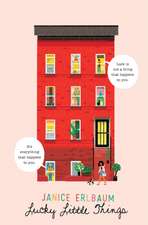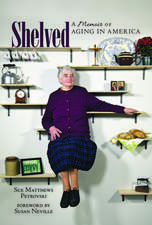Girlbomb: A Halfway Homeless Memoir
Autor Janice Erlbaumen Limba Engleză Paperback – 28 feb 2007 – vârsta de la 16 până la 18 ani
A wry, mesmerizing portrait of being underprivileged, underage, and underdressed in 1980s New York City, Girlbomb provides an unflinching look at street life, survival sex, female friendships, and first loves.
“A fast and engrossing read in the spirit of Girl, Interrupted.”
–Entertainment Weekly
“Gripping . . . a wry, compelling memoir of what it means to stand up for yourself, especially when no one else will.”
–Bust
“How satisfying to watch Erlbaum survive adolescence and produce a smart, engaging book.”
–The New York Times Book Review
“Erlbaum’s survival is hard-won, the journey rendered with page-turning intensity.”
–New York Post
“A fast and engrossing read in the spirit of Girl, Interrupted.”
–Entertainment Weekly
“Gritty . . . perversely riveting. You want her to survive.”
–The Washington Post Book World
Preț: 104.81 lei
Nou
Puncte Express: 157
Preț estimativ în valută:
20.06€ • 20.86$ • 16.56£
20.06€ • 20.86$ • 16.56£
Carte tipărită la comandă
Livrare economică 15-29 aprilie
Preluare comenzi: 021 569.72.76
Specificații
ISBN-13: 9780812974560
ISBN-10: 0812974565
Pagini: 252
Dimensiuni: 135 x 202 x 15 mm
Greutate: 0.19 kg
Ediția:1 Reprint
Editura: Villard Books
ISBN-10: 0812974565
Pagini: 252
Dimensiuni: 135 x 202 x 15 mm
Greutate: 0.19 kg
Ediția:1 Reprint
Editura: Villard Books
Recenzii
Advance praise for Girlbomb
“This affecting, silver-tongued memoir observes with absolute precision the slipperiness of being a teenaged girl in a world where friends backstab and parents betray you. Candid, searing, and, at times, wickedly funny, Girlbomb is an uncommon story about a remarkable adolescent who, in a bid to save herself, chose homelessness over her mother’s one continuous mistake. Stunning.”
–Amanda Stern author of The Long Haul
“Janice Erlbaum has all the stuff that cult icons are made of. Women everywhere will find their Basketball Diaries in Girlbomb.”
–Koren Zailckas, author of Smashed: Story of a Drunken Girlhood
From the Hardcover edition.
“This affecting, silver-tongued memoir observes with absolute precision the slipperiness of being a teenaged girl in a world where friends backstab and parents betray you. Candid, searing, and, at times, wickedly funny, Girlbomb is an uncommon story about a remarkable adolescent who, in a bid to save herself, chose homelessness over her mother’s one continuous mistake. Stunning.”
–Amanda Stern author of The Long Haul
“Janice Erlbaum has all the stuff that cult icons are made of. Women everywhere will find their Basketball Diaries in Girlbomb.”
–Koren Zailckas, author of Smashed: Story of a Drunken Girlhood
From the Hardcover edition.
Notă biografică
Janice Erlbaum is a columnist for BUST magazine and a volunteer at a shelter for homeless teenagers. She lives in New York City with her boyfriend and their three cats. This is her first book.
Visit the author’s website at www.girlbomb.com.
From the Hardcover edition.
Visit the author’s website at www.girlbomb.com.
From the Hardcover edition.
Extras
1
Intake November 18, 1984
Where do you think you’re going?
Forty-seventh Street and Tenth Avenue—that’s what the lady on the phone told me. “The building has a big sign with a cross on it,” she said kindly. “We’ll be looking out for you.”
I hung up the pay phone and hoisted my book bag. I was fifteen years old, it was ten-thirty on a windy November night, and I was somewhere in Hell’s Kitchen. I’d been marching uptown since Washington Square Park, not knowing where I was going, my hands swollen and tingly from swinging furiously at my sides, my book bag denting my hip with each step.
“Yo, where you goin’, miss? I could walk with you?”
No, papí. I was walking alone tonight. I was going to a shelter, which was on Forty-seventh and Tenth, and I wasn’t stopping for anybody—not the hustlers hawking nickel bags, not the Italian homeboys in their tricked-out IROC catcalling me. Not even a break in stride for the two boys passing me, shoving each other and laughing, then yelling, “Hey, miss, you dropped something!”
“Hey, miss!”
You miss me yet, Mom? The way you missed Dave so much you just had to take him back? It’s only been a few hours, maybe you think I’m walking around the neighborhood, burning off some steam, I’ll be coming back any minute. Or maybe I went to one of my friends’ houses—what were those girls’ names again?
“Pssssst. Over here, girl.”
I was on a bad block, a gauntlet of drunks, hookers, and bums, leading nowhere. I’d been walking quickly, but now I started really hoofing it, still trying not to out and out run, red-eyed men hissing at me from every shadow. I was almost at the address the lady gave me, but I didn’t see the building with the cross. Don’t panic, I thought, panicking, faint tears blurring my sight. Maybe it’s across the street.
Across the street was a rotting industrial plant. Catty-corner was a diner and a church. But right here was a building covered in scaffolding, and a man approaching me from a driveway, asking, “Are you looking for someplace?”
“No,” I said quickly, moving away. “I’m fine.”
“You sure? Because this is a shelter here.”
I stopped, took in the man’s blue windbreaker and badge. His face was impassive, but his hand was outstretched.
“You need to come on in here tonight?”
I sat in a plastic chair and waited. The place looked like places look, I guessed. Linoleum. Windows that probably didn’t open. A lot of taped-up construction paper on the walls, memos on bulletin boards. no hats or do-rags inside thank you. prayer group 7:30 chapel. Prayer group, I thought—Oh Christ, not Jesus.
An older woman with short gray hair and a black smock came out of her office and nodded at me. A nun. I didn’t know any nuns. I thought nuns were spooky. This one appeared human. She looked like a middle-aged gym teacher in a smock.
“Come in,” she suggested. I rose and followed her.
The entire inside of the nun’s office was papered with missing posters, ghostly kids smiling down in smudgy, high-contrast black and white. Shameeka Wells, age 16, missing from Brooklyn since September. Ebony Johnson, age 15, missing from the Bronx since July. Ebony’s fax had curled and yellowed, but her eyes burned bright from the center of a black splotch. Her picture looked like it had been drawn by a seismograph. Ebony was not smiling.
The nun sat at her desk, engulfed in this cage of missing kids. She looked concerned, and busy.
“How are you tonight?” she asked.
I was . . . How was I? Disoriented. In shock. Just two hours ago, I was heating up some lentil soup at my mom’s in Brooklyn, thinking I’d eat it and maybe read some Edith Wharton before bed. Now here I was at a runaway shelter, staring at a nun’s mustache and wondering where I was going to spend the rest of my adolescence.
“I’m okay,” I said.
She nodded and tried to meet my eyes. “Is there a reason you came here tonight?”
I didn’t want to cry, so I kept my eyes averted. “I can’t live at home anymore.”
She nodded again, like she agreed. “Can you tell me about it?”
“I . . .”
Where to start? I was born, and . . .
“My stepfather . . . he’s crazy. He’s . . . abusive to my mother. And he’s creepy. And they have a baby, and he shakes the baby.” I winced, thinking about Dave handling baby Jake, panged with guilt over leaving my brother behind.
The nun bobbed her head seriously, like Yes, you’re right, that sounds bad. I was heartened to continue.
“So . . . my mom and him fight all the time, and he gets crazy and violent, and she throws him out—like, ten times in the past two years. And every time, it’s the same. She calls the cops on him, and then she changes the locks, and we go to court to get an order of protection . . .”
The nun’s nod knew what was coming next. It knew before I knew. I still couldn’t believe it.
“And then she takes him back.”
She was taking him back. She swore she wasn’t going to do it this time, and here she was, doing it again. I told her, after the last time, “That’s it. If you take him back this time, I’m leaving.” She swore to me, “Jan, I’m not taking him back.”
Until tonight. There I was, heating up some soup, and my mother came into the kitchen, and she said we had to talk. And I knew what that meant, so I turned off the soup, went into my room, and got my bag.
And I left.
“So here you are,” said the nun, like something was settled.
I shook my head yes. I looked her in the eye. Then my eyes welled up again, and I looked at my lap.
I didn’t know what else to say. The nun wasn’t questioning me, she wasn’t jotting down notes. I didn’t have to go on with my story, didn’t have to back it up with dates and details the way I did in depositions with my mother’s endless divorce lawyers. She wasn’t asking me for proof that I wasn’t lying, or exaggerating—Yes, we know your stepfather threatened to hit you, but did he ever actually strike you? She just believed me.
“What about your father? Do you have a relationship with him?”
Ugh. Another case history, in twenty words or less: “Not really. He’s abusive. He hit me when I was a kid. We don’t talk anymore. I can’t live with him.”
Case closed. “Any other family you’d like us to contact?”
“No.” No grandparents, no aunts. No godparents, no friends’ fami-lies. No friends. Nobody.
Nod. She closed her eyes for a moment and drew in a breath. I got the crazy idea she was saying a prayer for me.
She opened her eyes and said, “We’re glad you came to us tonight.”
The fifth-floor lounge was crowded. Twenty or thirty girls were sitting or lying on thin foam mattresses on the floor of the large rectangular room, some curled up with their jackets over their heads like they were trying to sleep, which clearly wasn’t going to happen with the ruckus under way. Two girls argued loudly over the custody of a Walkman; another hollered at her neighbor to move the fuck over before I wreck you, ho. Several animated conversations dropped to whispers as the nun escorted me to the supply closet and pulled out a pallet for me. I distinctly heard the word white more than once, and I knew, from a quick scan of the room, that it had to be directed at me.
“We just did head count,” said the nun. “It’s almost lights out. Here’re toiletries for you. We’ll take you over to the minors’ wing after breakfast. It’s in a separate building. It’s a little quieter over there.” She handed me a Baggie with a toothbrush, a small tube of paste, and a hotel-sized soap. I put it in my book bag, which I clamped to my side. “Have a good night.”
The nun walked away, and I was left to my foam mattress. I was in the furthermost corner by the closet, right up against the wall. The girl to my right was sleeping with her coat over her head and her sneakers on; either she or somebody else had tied the laces together. How could she sleep in here? People were cursing one another out, shrieking with laughter, stomping around the room looking for the bitch who took my fucking comb. The girl on my other side gabbed in Creole to her neighbor.
I was too wired to sleep anyway. I leaned back against the wall and looked around the room. Several people looked back at me, some frowned. I lowered my gaze, dipped my head, and gently closed my eyes as though I was exhausted.
My mind raced, as it had been racing all night, since I stepped out my mother’s door, What now what now what now what now. I didn’t know. So far I’d been running on instinct and adrenaline, following my feet. They took me out of the apartment, down Flatbush Avenue to the D train, through cold, empty Washington Square Park, to a pay phone in Hell’s Kitchen. Now we were here. What now? What now? What now?
I heard someone say, “What that white girl doin’ here?”
Quiet.
Then, “Same as you, bitch, she ain’t got noplace else to go.”
Laughs.
Welcome to the asylum, to the first night of the rest of your life. I stayed with my eyes closed and my back to the wall until the lights went out. Then I curled up with my jacket over my head and my sneakers on, put my thumb in my mouth, and stared at the darkness for hours, until I finally fell something like asleep.
2
Outtake It was all Dave’s fault.
Okay, maybe life wasn’t perfect before Dave came along, but it was definitely way better. It’s true that my mom had picked some crappy husbands before, including my own father, an abusive tyrant she left when I was five. My father used to scream and hit and break the furniture, and he was still better than Dave, who did all of that, plus picked racist arguments in movie lines and threatened to burn down the dry cleaner’s. I mean, at least my father kept his temper tantrums in the family.
Dave Malley was crazy. He smelled crazy. He smelled like bad soup and aluminum foil, and his unfiltered Camels left murky stains on his fingers and teeth. I was introduced to Dave when I was twelve years old, and I wrote down that he was itchy. He was tall and wiry, and he pointed stagily with his cigarette as he spoke—“Very valuable skills to have, computer programming skills, very lucrative field.” He smirked at me, as though I should be impressed with him, which I wasn’t. My mother was. God only knew why. My mother could have done a million times better than Dave Malley.
My mother, Barb Rosen, was thirty-five years old, with a twelve-year-old daughter, but she looked like she was twenty-three. She was about five foot six, and model thin, with glossy auburn hair, green-gold eyes, bisque skin, and a wide smile, next to which lived a perfect little mole. Sometimes I sat and watched her, dressed for the office in her cowl-necked sweaters and high-heeled boots, and I could not believe how gorgeous she was. Meanwhile, I had a puffy, freckled face with a schnoz like my dad’s. It hardly seemed fair.
I had, I guess, sort of a crush on my mom, in that I thought about her a lot, I wanted to spend time with her, and I wanted her to like me. Any time she was paying attention to me, I was elated. I wanted more than anything to live just the two of us, just me and my mom. I’d been waiting for this blessed arrangement since I was five years old, when we left my father in the middle of the night and drove to my grandma’s in the Bronx, and my mom told me gravely, “It’s just us now, Jan.”
But it wasn’t just us, it was never just us. As soon as we left Grandma’s for our own Manhattan apartment, my mother met Joe, a droopy-eyed guy who stayed over in her room a lot. I had no use for Joe, and he had none for me. Then after Joe came Barry, the leisure-suited salesguy from New Jersey. Barry had curly hair, a gold Star of David around his neck, and three daughters, all older than me, all of whom despised me on sight. Within weeks of their first date, my mother moved us to the suburbs and married Barry, making him Crummy Husband Number Two, though he was probably the best of the lot. He was a “putz,” according to my mother—“I don’t know why I put up with him,” she’d confide to me, age eight, any time we were alone in the car. “He lets his ex-wife bleed him dry, and those girls of his are little nightmares.”
I agreed with everything my mother said. Even if I didn’t know what it meant. I developed a repertoire of sympathetic responses: “No. Really? Wow. Uh-huh?” The important thing was to keep her talking to me, feeding me information, making me indispensable.
“So I said, ‘Barry, you’re paying your ex-wife child support and you’re stuck raising them? Send them to their mother’s if she loves them so much!’ ” She punched the dashboard lighter, impatient.
I bobbed my head. “Yep. Mm-hmm. You’re right.”
I prayed every day for this marriage to end, wishing on every dandelion puff, fallen lash, face-up penny, and airplane masquerading as a shooting star. Maybe Barry wasn’t as scary as my own father, but he was kind of slimy, with his exposed chest hair and his incessant mom-fondling, and my stepsisters were like evil characters from a fairy tale, who delighted in pulling my index finger backward until it met my wrist. It took Mom and Barry almost three years to break up, by which point I was ten years old and didn’t really believe in wishing anymore; still, I was as gratified by their divorce as if I’d arranged it myself.
My mother and I moved back to Manhattan—“Just the two of us, Jan, won’t that be a relief?”—but then she immediately started dating again. First there was Sam the stuttering WASP, then Irv the importer with the pinkie ring, and then Richard the retiree, who was sixty-five fucking years old, for god’s sake. I really saw no rationale for any of them; they were charmless compared to my brilliant, adorable mom. It was like she just dated whoever was standing right in front of her at the time. Fortunately, Sam, Irv, and Richard lasted only a few months apiece. They were temps. They were like goldfish that died and got replaced, and nobody ever stopped to ask, “Hey, do we really want another goldfish?”
Sometimes my mother’s boyfriends overlapped a little, but sometimes there were a few delicious weeks in between them, when it was just us. We’d get up late on weekend mornings, me humming to myself over my fruit and yogurt, my mother in her bathrobe with her hair in a crown of curlers, her eyebrows not yet penciled in, smoking. “What do you want to do today, Jan?” she’d ask. “I have to stop by the office this afternoon, but we can go by the library and get you a book beforehand.” Great, super, hum hum hum. I was happy enough to sit in the anteroom of my mother’s one-woman events-planning office in Midtown, reading one of the Narnia books, listening to her droll, knowing voice on the phone with her clients, basking in her glamorous, efficient near-presence.
“Then maybe afterwards we can go to the Peacock for an éclair.” Well, that would just be cloud nine. To eat pastry in a café with my mom, and talk like adults, like good friends. She’d tell me interesting things about other grown-ups, for instance, did I remember her old boss, Dan McDonough, from when I was six? He was a terrible alcoholic. He passed out and peed his pants in the office once. Really? Sweet cream on my fingers. Oh yes. Of course, his business collapsed when my mother left him and went out on her own. It was a shame.
My mom always spoke the frank truth around me. Regarding Richard the retiree: “Honestly, Jan, if someone is always too tired to, you know, make love, then really, that’s . . .”
I nodded knowingly—she didn’t have to go on. Sex was an important part of a healthy, loving adult relationship! I was twelve, I’d read plenty of books. I totally understood.
“Richard was boring,” I added, shifting the subject a little. “He didn’t even like to do anything, like go to the movies.”
“I know, I know.” She exhaled, annoyed. She knew I didn’t like Richard, that I didn’t really like any of them, but I wasn’t supposed to express it outright. Disliking her boyfriends was her exclusive domain. Besides, I’d already won this battle by default; she’d dumped Richard the retiree last month, when he did not make a big enough deal out of her birthday. And now she was left, thirty-five years old, contemplating the oily skim on her cold coffee, alone.
For about a minute. Then she met Dave. Who was thirty years old and lived with his mother in Westchester. “Temporarily.” Dave was temporarily living with his mother in Westchester while he sought employment as a computer programmer. Within weeks, he was tempor-arily living with us.
Dave was six four, skinny, and balding, with glasses. Not only was he itchy, but he was sarcastic, critical, bossy, moody, and obnoxious. I watched him shove our elderly cat, Sausage, with his leg in an unkind manner, watched him castigate a meter maid in the street and then fume all night about “the Hispanics.” Definitely temporary, I blustered to myself, eyeing him with suspicion from the outskirts of the living room. Surely this goldfish will die quickly.
I tried to catch my mother’s eye to confirm, but she wasn’t looking at me. She was looking up at Dave, nervously ensconced under his gangly arm like she was along for the ride. What was it about him that kept her there? Once out of range, she tried to explain it to me. “He’s very bright, Jan, extremely high IQ. You know how hard that can be to negotiate.”
I didn’t like this explanation at all, first because it compared me to him, and I was not like him; second because it alluded to the difficulties I’d been having in school of late—skipping assignments, stealing a book from the library, “acting out” in class—which were all being blamed on my frustration with my own brain-busting intelligence. Yeah, too smart for my own good. That was me.
I sulked and waited for my mother to crack. Okay, so Dave was “bright,” and “sensitive,” and he was good company for her when she was feeling manic, as she often was these days—when she wanted to tear apart the kitchen for a full-scale reorganization, AM radio blaring, Dave was right there with the black coffee and cigarettes, egging her on. Dave could surprise her with tickets to see Neil Diamond in concert, which was something I could not do. But I could tell she didn’t enjoy the snide tone he sometimes took with her—“Well, who do you think runs the government, huh? Think about it, Barb. Think.” It flustered her, especially when he did it in front of me, and I got so anxious I put my thumb in my mouth. And then they both turned to me and said, “Don’t do that.” He embarrassed my mother by talking too loud, and taking issue with random people on the subway—“You can buy your own paper, buddy, and stop leaning over mine.” It bothered her that she couldn’t shop at the deli closest to the apartment anymore because Dave had called them “Paki cheats.” I sensed that whatever tense, desperate bond they had forged was fraying, and that it wouldn’t be long before my mother took me out for coffee and filled me in on a few vital facts about our new friend Dave.
I was sucking my thumb in my room one night before bed, and my mom came in, eyebrowless, in her curlers and robe. She looked peaked—there was a crease between her hooded eyes, and some wrinkles in her forehead I wasn’t used to seeing. I’d heard a lot of heated conversation from the master bedroom lately, noticed a lot of hushed voices and guarded looks between my mother and Dave, and my fingers were crossed for the complaining to begin. I thought, She’s going to tell me they’re breaking up.
She sat on my bed. “Jan, I have something to tell you, and I don’t expect it to be easy at first, but I think you’ll understand that it’s best for everyone.”
I must have been actively trying not to smile.
“I’m pregnant, and Dave and I have decided to have the baby.”
Gong. Like someone put a bell over my head and hit it with a hammer. Like an elevator cable snapped, and I was plummeting, dashing to my death underground. Stunned. Nauseated.
“Now, Jan, I know it may seem sudden, but this is the right decision.”
Her tone was warning.
Now, Jan, don’t fuck me up here. Don’t protest. Don’t say anything. I can always send you to live with your father, like I did during the Barry Marriage, when you were nine. Remember that? You didn’t like Barry, you didn’t like the girls, so I got your dad to take you for a while—that didn’t work out too well, did it? The hitting, the choking, the yelling—scariest six months of your life, right? You said you never wanted to go back there again as I recall. So don’t push it.
I tried to suppress the cry rising in my chest, tried to keep it down like vomit. This was the worst news I’d ever heard. Not only was she not going to get rid of this obnoxious weirdo, she was going to have a baby with him, and start a whole new family. I was being permanently displaced. It would never be just us.
“Jan.” My mother sounded impatient as I began to out and out sob. “Janice! This is a good thing, and I expect you to be happy about it.” I heard Dave lurking in the doorway, a malevolent bat. I pulled myself into a ball on my bed with my arms over my head. She reached out a hand and dully patted my shoulder. Softer now, she insisted, “Jan . . . honey, come on.”
We sat like that for a minute or so, her bony hand limp on my heaving shoulder, and then she removed her hand and turned away. I heaved and hiccupped, but her hand did not return. She sighed deeply, as though this was very hard for her.
“Jan,” she said, finally. “I understand that this is sudden. But this is the decision that both Dave and I have made, and you’re going to have to get used to it.”
I kept my arms over my head, chest hitching, as I felt her rise from her seat on the bed. She stopped by the door.
“I’m sorry you can’t see this as a good thing right now, but you will.”
She left, and I balled up even tighter, dense as a star, and wished one of us, any of us, was dead.
Then the fighting started.
Dave wasn’t happy about a few things around the house. My mom spent too much time at the office on weekends. She cut him off in the middle of a twenty-minute rant about judiciary conspiracies in small claims court. She took too long saying good night to me in my room, and I overheard him berating her in the kitchen—“She’s thirteen years old, Barb, and you treat her like a baby. And I’m sick of seeing her suck her thumb. And she doesn’t treat anybody with any respect, and frankly, it’s pissing me off.”
Sometimes she actually sat there and defended herself, explaining to Dave why, for instance, she had to go to work, as though all he needed was a refresher course on the concept of exchanging labor for money, and then he’d stop being insane. “Now, Dave, you know I have several key events coming up, and I have got to make at least ten or fifteen phone calls tomorrow or I will not be able to pull any of this off. I’m sorry you feel neglected, but this is my business, and—”
It never worked. He always started hollering at her, midsentence, “Bullshit! God, Barb, you are so full of shit. You know perfectly well that you swore to me . . .”
When the explaining failed, she skipped straight to yelling back at him. “Dave, calm down!”
I’d be crouched behind my bedroom door, listening as it escalated like a bad fever. Dave screaming accusations and threats at my mom—“I know you’re up to something, and when I find out what it is . . .”—shoving the furniture and taunting her. “Is this what you want? Is this what you want, Barb?” Then her voice, sharp and furious, like she was commanding a dog. “Stop it, Dave! Stop it!” And me, hiding behind my bedroom door on my knees, never protecting her.
If there was a dandelion puff handy, I would have blown its head off, wishing for Dave to go away. She had to break up with him sometime, I prayed, baby or no. I took all the pills out of the medicine cabi-net and held them in my hand until the easy-swallow coating left mottled stains in my palm; then I put them back in their bottles. They were Plan B.
One night when my mother was five months pregnant, they were in the living room arguing—“Dave, the man is a client of mine! You’re being completely irrational!” “Don’t tell me I’m being fucking irrational, I know you’re fucking around!” It was almost midnight, they’d been at it for hours, and I was sore from kneeling in my usual spot behind the door, in the prayer-vomiting position.
“How do I know this baby is mine!” Dave demanded, like on a soap opera.
“That’s absurd and you know it,” she spat. “You’re out of control, and I’m not going to—”
“Out of control? You want to see out of control?”
I heard a table overturn and my mother yelling, “Stop it, Dave, stop it!” Less commanding now, more shrill, like when my father would start to lose it on her. I cried out without meaning to, “Mom!”
The action stopped. I cringed, pressing myself further into the door hinge. Dave had given me enough warnings—“Don’t get smart with me, missy, or I’ll show you what’s what.” Now he was going to come in here and kill me. I heard his heavy footfalls—which way?—going toward the front door. There was a thunk as he kicked the plastic umbrella stand, then the door ripped open.
“Fuck you, Barb,” he hissed, and he let the door slam hard.
Ten. Nine. Eight. Seven. Six. Five. Four. Three. Two. One.
Nothing.
In horror movies, the dead psycho usually popped up again around “three.”
Maybe Dave was not coming back.
My mom called, “Jan?” Very concerned. I popped up from my shin-hugging cringe right away. My head swam.
“Mom?” I stumbled into the living room, where the coffee table was now on its side, drinks seeping into the rug along with ashes and butts, and pieces of the Times everywhere. She was muttering, trying to scoop up the worst of the broken glass before the cat could get to it.
She didn’t look at me. “I’m sorry you had to hear that.”
I bent down, dazed, and started blotting at the carpet with the newspaper.
She said, “Honey, get paper towels.”
My mother was moving briskly, but I was clumsy from shaking. Is the door locked? I wondered. Did she put on the chain? I kept blotting stupidly, dripping tears. She blew past me and flung a sopping handful of crap into the garbage.
“Well, he’s certainly not coming back after that little display. You don’t have to worry about that.”
She flicked her hands, finished. I nodded gratefully at the news, still shaking. Maybe I’d prayed for it to end, but not like this.
“I’m sorry about this whole thing, Jan. I really am. Come here.”
I didn’t know how to hug my mom now that she was pregnant. I approached her side, and she took me under her shoulder.
“It’ll be just us now,” she promised. “Just us and the baby.”
Just us and the baby. That didn’t sound so bad. As long as Dave wasn’t around anymore. I burrowed deeper into her side. “What about Dave?”
“He’s gone now,” she assured me. “And good riddance.”
Two days later, Dave was back.
He came back for his things, and they wound up talking. “Jan,” my mom explained, “Dave and I have a lot of stuff we have to work out.”
Obviously. They spent almost the whole weekend behind closed doors. I got sent out with money for ice cream and video games, which I spent on cigarettes, which I smoked on nearby stoops until I was dizzy.
My mother and Dave reconciled. What could I say? There was no evidence I could present against him that she didn’t already have. He was awful. He scared the shit out of me. I hated him. She knew.
She told me, “The fact is, Dave and I are going to have a baby, and we are going to try to be a family.” She sounded like she was speaking from notes. “Now, we’ve talked about getting couples therapy, and that’s definitely something we’re going to think about. But for right now, I want you to pitch in a little more and help us all get along better.”
I hung my head in despair, which she could construe as a yes if she wanted. It was futile, I might as well take the pills.
Their next breakup: She was eight months pregnant, and they were arguing, because he wanted them to get a bigger apartment, and she said they couldn’t afford it. This sent him into a boiling rage—“That’s bullshit, Barb! I know how much you’ve got socked away!”—matched only by hers—“Without my savings, we’d all be out on the street!” She paid for everything these days, as Dave had become unemployable for more than two weeks at a time, and she was sick of it, on top of being very pregnant. “We can’t afford it, and that’s final!”
It went on like this forever, as I crouched behind my bedroom door, hyperventilating into my clasped hands. The sound of the chair scraping across the floor as he shoved her down—“Sit down! You’re going to listen to me now!”
“Get off of me!”
“You’re going to sit down and listen to me!”
Don’t butt in, she’d warned me. If I need you to call the police, I’ll shout. Otherwise, stay in your room. I rocked back and forth on my burning heels, panting, bladder ready to burst.
“Sit the fuck down, Barb!” The honk of the chair against the floor, the groan of a familiar ghost.
“Stop it! Stop it, or I’m calling the police!”
Is this me? Is this my cue? Does she need me?
My eyes were squeezed shut behind my steepled hands, I saw only a blistering red field. Heard something clatter across the room—the ashtray. The sound of the phone off the hook—“I’m calling them right now!”
His heavy stomp out the door. Slam.
This was their second breakup. This one was serious—she was going to go to court this time and get an order of protection against him, that was how serious it was. “We’ll write you a note for school tomorrow, you can come with me in case you need to testify.” I nodded, or my head shook up and down with nerves, whichever. She called a locksmith, who came in his coveralls and changed the locks, even though it was around one in the morning. I was impressed. My mother smoked and rubbed her round belly as he worked.
“It was a mistake to think he could act like a human being.” Puff, puff. “I am very sorry about this, Jan. You should not have to put up with this.”
We did not hug this time. We watched the locksmith drill the bright brass fixture to the wall. We went to court the next day.
Five days later, they reconciled.
A month later, she gave birth to my half brother, Jake, a healthy, beatific baby boy with features just like his dad’s. She and Dave were married. We moved to a bigger apartment, in the cracked-out neighbor-hood of Crown Heights, Brooklyn. We were a family.
In other news: I turned fourteen. I grew breasts—first the left one, then the right. I moved from a small private middle school in the East Village to one of the city’s most competitive public high schools, where I started cutting class, drinking during the day, and smoking as much pot as money, time, and lung power allowed. I hung an Adam Ant poster in my new bedroom, and my mother glanced at it suspiciously as she hurried past the doorway, on her way to dealing with Jake. “I don’t know what’s happening with you lately, Jan, but you’d better get straightened out.”
Things could not have sucked more at home. As bad as the fights were, the times in between were even worse, because that was when Dave and my mother were aggressively trying to pretend they weren’t both fucking nuts. God, how I loathed her when she was with him. She adopted all his mannerisms, his sarcastic sneer, his “sociological” observations on “those kinds of people.” Together, they made these desperate, ridiculous plans—“Dave and I are talking about having another baby.” “Next year, we’re thinking of moving to France”—and my internal eyeballs rolled so hard they practically bounced.
My mom and Dave became manic about putting a good face on things, both seething with paranoia and rage, and I was often the proxy target of their mutual hatred. They’d call me in for a “family meeting” and tell me that I wasn’t doing my part around the house, that they hated my clothes, and what was I doing with those hickeys, missy? “You need to cool it with the boys.” My disgusting stepfather leered as my mother imperiously agreed. “You’re really stacked. The boys must be on you like dogs.”
His eyes flicked over me like a tongue. It was around this time that I started to think about leaving.
From the Hardcover edition.
Intake November 18, 1984
Where do you think you’re going?
Forty-seventh Street and Tenth Avenue—that’s what the lady on the phone told me. “The building has a big sign with a cross on it,” she said kindly. “We’ll be looking out for you.”
I hung up the pay phone and hoisted my book bag. I was fifteen years old, it was ten-thirty on a windy November night, and I was somewhere in Hell’s Kitchen. I’d been marching uptown since Washington Square Park, not knowing where I was going, my hands swollen and tingly from swinging furiously at my sides, my book bag denting my hip with each step.
“Yo, where you goin’, miss? I could walk with you?”
No, papí. I was walking alone tonight. I was going to a shelter, which was on Forty-seventh and Tenth, and I wasn’t stopping for anybody—not the hustlers hawking nickel bags, not the Italian homeboys in their tricked-out IROC catcalling me. Not even a break in stride for the two boys passing me, shoving each other and laughing, then yelling, “Hey, miss, you dropped something!”
“Hey, miss!”
You miss me yet, Mom? The way you missed Dave so much you just had to take him back? It’s only been a few hours, maybe you think I’m walking around the neighborhood, burning off some steam, I’ll be coming back any minute. Or maybe I went to one of my friends’ houses—what were those girls’ names again?
“Pssssst. Over here, girl.”
I was on a bad block, a gauntlet of drunks, hookers, and bums, leading nowhere. I’d been walking quickly, but now I started really hoofing it, still trying not to out and out run, red-eyed men hissing at me from every shadow. I was almost at the address the lady gave me, but I didn’t see the building with the cross. Don’t panic, I thought, panicking, faint tears blurring my sight. Maybe it’s across the street.
Across the street was a rotting industrial plant. Catty-corner was a diner and a church. But right here was a building covered in scaffolding, and a man approaching me from a driveway, asking, “Are you looking for someplace?”
“No,” I said quickly, moving away. “I’m fine.”
“You sure? Because this is a shelter here.”
I stopped, took in the man’s blue windbreaker and badge. His face was impassive, but his hand was outstretched.
“You need to come on in here tonight?”
I sat in a plastic chair and waited. The place looked like places look, I guessed. Linoleum. Windows that probably didn’t open. A lot of taped-up construction paper on the walls, memos on bulletin boards. no hats or do-rags inside thank you. prayer group 7:30 chapel. Prayer group, I thought—Oh Christ, not Jesus.
An older woman with short gray hair and a black smock came out of her office and nodded at me. A nun. I didn’t know any nuns. I thought nuns were spooky. This one appeared human. She looked like a middle-aged gym teacher in a smock.
“Come in,” she suggested. I rose and followed her.
The entire inside of the nun’s office was papered with missing posters, ghostly kids smiling down in smudgy, high-contrast black and white. Shameeka Wells, age 16, missing from Brooklyn since September. Ebony Johnson, age 15, missing from the Bronx since July. Ebony’s fax had curled and yellowed, but her eyes burned bright from the center of a black splotch. Her picture looked like it had been drawn by a seismograph. Ebony was not smiling.
The nun sat at her desk, engulfed in this cage of missing kids. She looked concerned, and busy.
“How are you tonight?” she asked.
I was . . . How was I? Disoriented. In shock. Just two hours ago, I was heating up some lentil soup at my mom’s in Brooklyn, thinking I’d eat it and maybe read some Edith Wharton before bed. Now here I was at a runaway shelter, staring at a nun’s mustache and wondering where I was going to spend the rest of my adolescence.
“I’m okay,” I said.
She nodded and tried to meet my eyes. “Is there a reason you came here tonight?”
I didn’t want to cry, so I kept my eyes averted. “I can’t live at home anymore.”
She nodded again, like she agreed. “Can you tell me about it?”
“I . . .”
Where to start? I was born, and . . .
“My stepfather . . . he’s crazy. He’s . . . abusive to my mother. And he’s creepy. And they have a baby, and he shakes the baby.” I winced, thinking about Dave handling baby Jake, panged with guilt over leaving my brother behind.
The nun bobbed her head seriously, like Yes, you’re right, that sounds bad. I was heartened to continue.
“So . . . my mom and him fight all the time, and he gets crazy and violent, and she throws him out—like, ten times in the past two years. And every time, it’s the same. She calls the cops on him, and then she changes the locks, and we go to court to get an order of protection . . .”
The nun’s nod knew what was coming next. It knew before I knew. I still couldn’t believe it.
“And then she takes him back.”
She was taking him back. She swore she wasn’t going to do it this time, and here she was, doing it again. I told her, after the last time, “That’s it. If you take him back this time, I’m leaving.” She swore to me, “Jan, I’m not taking him back.”
Until tonight. There I was, heating up some soup, and my mother came into the kitchen, and she said we had to talk. And I knew what that meant, so I turned off the soup, went into my room, and got my bag.
And I left.
“So here you are,” said the nun, like something was settled.
I shook my head yes. I looked her in the eye. Then my eyes welled up again, and I looked at my lap.
I didn’t know what else to say. The nun wasn’t questioning me, she wasn’t jotting down notes. I didn’t have to go on with my story, didn’t have to back it up with dates and details the way I did in depositions with my mother’s endless divorce lawyers. She wasn’t asking me for proof that I wasn’t lying, or exaggerating—Yes, we know your stepfather threatened to hit you, but did he ever actually strike you? She just believed me.
“What about your father? Do you have a relationship with him?”
Ugh. Another case history, in twenty words or less: “Not really. He’s abusive. He hit me when I was a kid. We don’t talk anymore. I can’t live with him.”
Case closed. “Any other family you’d like us to contact?”
“No.” No grandparents, no aunts. No godparents, no friends’ fami-lies. No friends. Nobody.
Nod. She closed her eyes for a moment and drew in a breath. I got the crazy idea she was saying a prayer for me.
She opened her eyes and said, “We’re glad you came to us tonight.”
The fifth-floor lounge was crowded. Twenty or thirty girls were sitting or lying on thin foam mattresses on the floor of the large rectangular room, some curled up with their jackets over their heads like they were trying to sleep, which clearly wasn’t going to happen with the ruckus under way. Two girls argued loudly over the custody of a Walkman; another hollered at her neighbor to move the fuck over before I wreck you, ho. Several animated conversations dropped to whispers as the nun escorted me to the supply closet and pulled out a pallet for me. I distinctly heard the word white more than once, and I knew, from a quick scan of the room, that it had to be directed at me.
“We just did head count,” said the nun. “It’s almost lights out. Here’re toiletries for you. We’ll take you over to the minors’ wing after breakfast. It’s in a separate building. It’s a little quieter over there.” She handed me a Baggie with a toothbrush, a small tube of paste, and a hotel-sized soap. I put it in my book bag, which I clamped to my side. “Have a good night.”
The nun walked away, and I was left to my foam mattress. I was in the furthermost corner by the closet, right up against the wall. The girl to my right was sleeping with her coat over her head and her sneakers on; either she or somebody else had tied the laces together. How could she sleep in here? People were cursing one another out, shrieking with laughter, stomping around the room looking for the bitch who took my fucking comb. The girl on my other side gabbed in Creole to her neighbor.
I was too wired to sleep anyway. I leaned back against the wall and looked around the room. Several people looked back at me, some frowned. I lowered my gaze, dipped my head, and gently closed my eyes as though I was exhausted.
My mind raced, as it had been racing all night, since I stepped out my mother’s door, What now what now what now what now. I didn’t know. So far I’d been running on instinct and adrenaline, following my feet. They took me out of the apartment, down Flatbush Avenue to the D train, through cold, empty Washington Square Park, to a pay phone in Hell’s Kitchen. Now we were here. What now? What now? What now?
I heard someone say, “What that white girl doin’ here?”
Quiet.
Then, “Same as you, bitch, she ain’t got noplace else to go.”
Laughs.
Welcome to the asylum, to the first night of the rest of your life. I stayed with my eyes closed and my back to the wall until the lights went out. Then I curled up with my jacket over my head and my sneakers on, put my thumb in my mouth, and stared at the darkness for hours, until I finally fell something like asleep.
2
Outtake It was all Dave’s fault.
Okay, maybe life wasn’t perfect before Dave came along, but it was definitely way better. It’s true that my mom had picked some crappy husbands before, including my own father, an abusive tyrant she left when I was five. My father used to scream and hit and break the furniture, and he was still better than Dave, who did all of that, plus picked racist arguments in movie lines and threatened to burn down the dry cleaner’s. I mean, at least my father kept his temper tantrums in the family.
Dave Malley was crazy. He smelled crazy. He smelled like bad soup and aluminum foil, and his unfiltered Camels left murky stains on his fingers and teeth. I was introduced to Dave when I was twelve years old, and I wrote down that he was itchy. He was tall and wiry, and he pointed stagily with his cigarette as he spoke—“Very valuable skills to have, computer programming skills, very lucrative field.” He smirked at me, as though I should be impressed with him, which I wasn’t. My mother was. God only knew why. My mother could have done a million times better than Dave Malley.
My mother, Barb Rosen, was thirty-five years old, with a twelve-year-old daughter, but she looked like she was twenty-three. She was about five foot six, and model thin, with glossy auburn hair, green-gold eyes, bisque skin, and a wide smile, next to which lived a perfect little mole. Sometimes I sat and watched her, dressed for the office in her cowl-necked sweaters and high-heeled boots, and I could not believe how gorgeous she was. Meanwhile, I had a puffy, freckled face with a schnoz like my dad’s. It hardly seemed fair.
I had, I guess, sort of a crush on my mom, in that I thought about her a lot, I wanted to spend time with her, and I wanted her to like me. Any time she was paying attention to me, I was elated. I wanted more than anything to live just the two of us, just me and my mom. I’d been waiting for this blessed arrangement since I was five years old, when we left my father in the middle of the night and drove to my grandma’s in the Bronx, and my mom told me gravely, “It’s just us now, Jan.”
But it wasn’t just us, it was never just us. As soon as we left Grandma’s for our own Manhattan apartment, my mother met Joe, a droopy-eyed guy who stayed over in her room a lot. I had no use for Joe, and he had none for me. Then after Joe came Barry, the leisure-suited salesguy from New Jersey. Barry had curly hair, a gold Star of David around his neck, and three daughters, all older than me, all of whom despised me on sight. Within weeks of their first date, my mother moved us to the suburbs and married Barry, making him Crummy Husband Number Two, though he was probably the best of the lot. He was a “putz,” according to my mother—“I don’t know why I put up with him,” she’d confide to me, age eight, any time we were alone in the car. “He lets his ex-wife bleed him dry, and those girls of his are little nightmares.”
I agreed with everything my mother said. Even if I didn’t know what it meant. I developed a repertoire of sympathetic responses: “No. Really? Wow. Uh-huh?” The important thing was to keep her talking to me, feeding me information, making me indispensable.
“So I said, ‘Barry, you’re paying your ex-wife child support and you’re stuck raising them? Send them to their mother’s if she loves them so much!’ ” She punched the dashboard lighter, impatient.
I bobbed my head. “Yep. Mm-hmm. You’re right.”
I prayed every day for this marriage to end, wishing on every dandelion puff, fallen lash, face-up penny, and airplane masquerading as a shooting star. Maybe Barry wasn’t as scary as my own father, but he was kind of slimy, with his exposed chest hair and his incessant mom-fondling, and my stepsisters were like evil characters from a fairy tale, who delighted in pulling my index finger backward until it met my wrist. It took Mom and Barry almost three years to break up, by which point I was ten years old and didn’t really believe in wishing anymore; still, I was as gratified by their divorce as if I’d arranged it myself.
My mother and I moved back to Manhattan—“Just the two of us, Jan, won’t that be a relief?”—but then she immediately started dating again. First there was Sam the stuttering WASP, then Irv the importer with the pinkie ring, and then Richard the retiree, who was sixty-five fucking years old, for god’s sake. I really saw no rationale for any of them; they were charmless compared to my brilliant, adorable mom. It was like she just dated whoever was standing right in front of her at the time. Fortunately, Sam, Irv, and Richard lasted only a few months apiece. They were temps. They were like goldfish that died and got replaced, and nobody ever stopped to ask, “Hey, do we really want another goldfish?”
Sometimes my mother’s boyfriends overlapped a little, but sometimes there were a few delicious weeks in between them, when it was just us. We’d get up late on weekend mornings, me humming to myself over my fruit and yogurt, my mother in her bathrobe with her hair in a crown of curlers, her eyebrows not yet penciled in, smoking. “What do you want to do today, Jan?” she’d ask. “I have to stop by the office this afternoon, but we can go by the library and get you a book beforehand.” Great, super, hum hum hum. I was happy enough to sit in the anteroom of my mother’s one-woman events-planning office in Midtown, reading one of the Narnia books, listening to her droll, knowing voice on the phone with her clients, basking in her glamorous, efficient near-presence.
“Then maybe afterwards we can go to the Peacock for an éclair.” Well, that would just be cloud nine. To eat pastry in a café with my mom, and talk like adults, like good friends. She’d tell me interesting things about other grown-ups, for instance, did I remember her old boss, Dan McDonough, from when I was six? He was a terrible alcoholic. He passed out and peed his pants in the office once. Really? Sweet cream on my fingers. Oh yes. Of course, his business collapsed when my mother left him and went out on her own. It was a shame.
My mom always spoke the frank truth around me. Regarding Richard the retiree: “Honestly, Jan, if someone is always too tired to, you know, make love, then really, that’s . . .”
I nodded knowingly—she didn’t have to go on. Sex was an important part of a healthy, loving adult relationship! I was twelve, I’d read plenty of books. I totally understood.
“Richard was boring,” I added, shifting the subject a little. “He didn’t even like to do anything, like go to the movies.”
“I know, I know.” She exhaled, annoyed. She knew I didn’t like Richard, that I didn’t really like any of them, but I wasn’t supposed to express it outright. Disliking her boyfriends was her exclusive domain. Besides, I’d already won this battle by default; she’d dumped Richard the retiree last month, when he did not make a big enough deal out of her birthday. And now she was left, thirty-five years old, contemplating the oily skim on her cold coffee, alone.
For about a minute. Then she met Dave. Who was thirty years old and lived with his mother in Westchester. “Temporarily.” Dave was temporarily living with his mother in Westchester while he sought employment as a computer programmer. Within weeks, he was tempor-arily living with us.
Dave was six four, skinny, and balding, with glasses. Not only was he itchy, but he was sarcastic, critical, bossy, moody, and obnoxious. I watched him shove our elderly cat, Sausage, with his leg in an unkind manner, watched him castigate a meter maid in the street and then fume all night about “the Hispanics.” Definitely temporary, I blustered to myself, eyeing him with suspicion from the outskirts of the living room. Surely this goldfish will die quickly.
I tried to catch my mother’s eye to confirm, but she wasn’t looking at me. She was looking up at Dave, nervously ensconced under his gangly arm like she was along for the ride. What was it about him that kept her there? Once out of range, she tried to explain it to me. “He’s very bright, Jan, extremely high IQ. You know how hard that can be to negotiate.”
I didn’t like this explanation at all, first because it compared me to him, and I was not like him; second because it alluded to the difficulties I’d been having in school of late—skipping assignments, stealing a book from the library, “acting out” in class—which were all being blamed on my frustration with my own brain-busting intelligence. Yeah, too smart for my own good. That was me.
I sulked and waited for my mother to crack. Okay, so Dave was “bright,” and “sensitive,” and he was good company for her when she was feeling manic, as she often was these days—when she wanted to tear apart the kitchen for a full-scale reorganization, AM radio blaring, Dave was right there with the black coffee and cigarettes, egging her on. Dave could surprise her with tickets to see Neil Diamond in concert, which was something I could not do. But I could tell she didn’t enjoy the snide tone he sometimes took with her—“Well, who do you think runs the government, huh? Think about it, Barb. Think.” It flustered her, especially when he did it in front of me, and I got so anxious I put my thumb in my mouth. And then they both turned to me and said, “Don’t do that.” He embarrassed my mother by talking too loud, and taking issue with random people on the subway—“You can buy your own paper, buddy, and stop leaning over mine.” It bothered her that she couldn’t shop at the deli closest to the apartment anymore because Dave had called them “Paki cheats.” I sensed that whatever tense, desperate bond they had forged was fraying, and that it wouldn’t be long before my mother took me out for coffee and filled me in on a few vital facts about our new friend Dave.
I was sucking my thumb in my room one night before bed, and my mom came in, eyebrowless, in her curlers and robe. She looked peaked—there was a crease between her hooded eyes, and some wrinkles in her forehead I wasn’t used to seeing. I’d heard a lot of heated conversation from the master bedroom lately, noticed a lot of hushed voices and guarded looks between my mother and Dave, and my fingers were crossed for the complaining to begin. I thought, She’s going to tell me they’re breaking up.
She sat on my bed. “Jan, I have something to tell you, and I don’t expect it to be easy at first, but I think you’ll understand that it’s best for everyone.”
I must have been actively trying not to smile.
“I’m pregnant, and Dave and I have decided to have the baby.”
Gong. Like someone put a bell over my head and hit it with a hammer. Like an elevator cable snapped, and I was plummeting, dashing to my death underground. Stunned. Nauseated.
“Now, Jan, I know it may seem sudden, but this is the right decision.”
Her tone was warning.
Now, Jan, don’t fuck me up here. Don’t protest. Don’t say anything. I can always send you to live with your father, like I did during the Barry Marriage, when you were nine. Remember that? You didn’t like Barry, you didn’t like the girls, so I got your dad to take you for a while—that didn’t work out too well, did it? The hitting, the choking, the yelling—scariest six months of your life, right? You said you never wanted to go back there again as I recall. So don’t push it.
I tried to suppress the cry rising in my chest, tried to keep it down like vomit. This was the worst news I’d ever heard. Not only was she not going to get rid of this obnoxious weirdo, she was going to have a baby with him, and start a whole new family. I was being permanently displaced. It would never be just us.
“Jan.” My mother sounded impatient as I began to out and out sob. “Janice! This is a good thing, and I expect you to be happy about it.” I heard Dave lurking in the doorway, a malevolent bat. I pulled myself into a ball on my bed with my arms over my head. She reached out a hand and dully patted my shoulder. Softer now, she insisted, “Jan . . . honey, come on.”
We sat like that for a minute or so, her bony hand limp on my heaving shoulder, and then she removed her hand and turned away. I heaved and hiccupped, but her hand did not return. She sighed deeply, as though this was very hard for her.
“Jan,” she said, finally. “I understand that this is sudden. But this is the decision that both Dave and I have made, and you’re going to have to get used to it.”
I kept my arms over my head, chest hitching, as I felt her rise from her seat on the bed. She stopped by the door.
“I’m sorry you can’t see this as a good thing right now, but you will.”
She left, and I balled up even tighter, dense as a star, and wished one of us, any of us, was dead.
Then the fighting started.
Dave wasn’t happy about a few things around the house. My mom spent too much time at the office on weekends. She cut him off in the middle of a twenty-minute rant about judiciary conspiracies in small claims court. She took too long saying good night to me in my room, and I overheard him berating her in the kitchen—“She’s thirteen years old, Barb, and you treat her like a baby. And I’m sick of seeing her suck her thumb. And she doesn’t treat anybody with any respect, and frankly, it’s pissing me off.”
Sometimes she actually sat there and defended herself, explaining to Dave why, for instance, she had to go to work, as though all he needed was a refresher course on the concept of exchanging labor for money, and then he’d stop being insane. “Now, Dave, you know I have several key events coming up, and I have got to make at least ten or fifteen phone calls tomorrow or I will not be able to pull any of this off. I’m sorry you feel neglected, but this is my business, and—”
It never worked. He always started hollering at her, midsentence, “Bullshit! God, Barb, you are so full of shit. You know perfectly well that you swore to me . . .”
When the explaining failed, she skipped straight to yelling back at him. “Dave, calm down!”
I’d be crouched behind my bedroom door, listening as it escalated like a bad fever. Dave screaming accusations and threats at my mom—“I know you’re up to something, and when I find out what it is . . .”—shoving the furniture and taunting her. “Is this what you want? Is this what you want, Barb?” Then her voice, sharp and furious, like she was commanding a dog. “Stop it, Dave! Stop it!” And me, hiding behind my bedroom door on my knees, never protecting her.
If there was a dandelion puff handy, I would have blown its head off, wishing for Dave to go away. She had to break up with him sometime, I prayed, baby or no. I took all the pills out of the medicine cabi-net and held them in my hand until the easy-swallow coating left mottled stains in my palm; then I put them back in their bottles. They were Plan B.
One night when my mother was five months pregnant, they were in the living room arguing—“Dave, the man is a client of mine! You’re being completely irrational!” “Don’t tell me I’m being fucking irrational, I know you’re fucking around!” It was almost midnight, they’d been at it for hours, and I was sore from kneeling in my usual spot behind the door, in the prayer-vomiting position.
“How do I know this baby is mine!” Dave demanded, like on a soap opera.
“That’s absurd and you know it,” she spat. “You’re out of control, and I’m not going to—”
“Out of control? You want to see out of control?”
I heard a table overturn and my mother yelling, “Stop it, Dave, stop it!” Less commanding now, more shrill, like when my father would start to lose it on her. I cried out without meaning to, “Mom!”
The action stopped. I cringed, pressing myself further into the door hinge. Dave had given me enough warnings—“Don’t get smart with me, missy, or I’ll show you what’s what.” Now he was going to come in here and kill me. I heard his heavy footfalls—which way?—going toward the front door. There was a thunk as he kicked the plastic umbrella stand, then the door ripped open.
“Fuck you, Barb,” he hissed, and he let the door slam hard.
Ten. Nine. Eight. Seven. Six. Five. Four. Three. Two. One.
Nothing.
In horror movies, the dead psycho usually popped up again around “three.”
Maybe Dave was not coming back.
My mom called, “Jan?” Very concerned. I popped up from my shin-hugging cringe right away. My head swam.
“Mom?” I stumbled into the living room, where the coffee table was now on its side, drinks seeping into the rug along with ashes and butts, and pieces of the Times everywhere. She was muttering, trying to scoop up the worst of the broken glass before the cat could get to it.
She didn’t look at me. “I’m sorry you had to hear that.”
I bent down, dazed, and started blotting at the carpet with the newspaper.
She said, “Honey, get paper towels.”
My mother was moving briskly, but I was clumsy from shaking. Is the door locked? I wondered. Did she put on the chain? I kept blotting stupidly, dripping tears. She blew past me and flung a sopping handful of crap into the garbage.
“Well, he’s certainly not coming back after that little display. You don’t have to worry about that.”
She flicked her hands, finished. I nodded gratefully at the news, still shaking. Maybe I’d prayed for it to end, but not like this.
“I’m sorry about this whole thing, Jan. I really am. Come here.”
I didn’t know how to hug my mom now that she was pregnant. I approached her side, and she took me under her shoulder.
“It’ll be just us now,” she promised. “Just us and the baby.”
Just us and the baby. That didn’t sound so bad. As long as Dave wasn’t around anymore. I burrowed deeper into her side. “What about Dave?”
“He’s gone now,” she assured me. “And good riddance.”
Two days later, Dave was back.
He came back for his things, and they wound up talking. “Jan,” my mom explained, “Dave and I have a lot of stuff we have to work out.”
Obviously. They spent almost the whole weekend behind closed doors. I got sent out with money for ice cream and video games, which I spent on cigarettes, which I smoked on nearby stoops until I was dizzy.
My mother and Dave reconciled. What could I say? There was no evidence I could present against him that she didn’t already have. He was awful. He scared the shit out of me. I hated him. She knew.
She told me, “The fact is, Dave and I are going to have a baby, and we are going to try to be a family.” She sounded like she was speaking from notes. “Now, we’ve talked about getting couples therapy, and that’s definitely something we’re going to think about. But for right now, I want you to pitch in a little more and help us all get along better.”
I hung my head in despair, which she could construe as a yes if she wanted. It was futile, I might as well take the pills.
Their next breakup: She was eight months pregnant, and they were arguing, because he wanted them to get a bigger apartment, and she said they couldn’t afford it. This sent him into a boiling rage—“That’s bullshit, Barb! I know how much you’ve got socked away!”—matched only by hers—“Without my savings, we’d all be out on the street!” She paid for everything these days, as Dave had become unemployable for more than two weeks at a time, and she was sick of it, on top of being very pregnant. “We can’t afford it, and that’s final!”
It went on like this forever, as I crouched behind my bedroom door, hyperventilating into my clasped hands. The sound of the chair scraping across the floor as he shoved her down—“Sit down! You’re going to listen to me now!”
“Get off of me!”
“You’re going to sit down and listen to me!”
Don’t butt in, she’d warned me. If I need you to call the police, I’ll shout. Otherwise, stay in your room. I rocked back and forth on my burning heels, panting, bladder ready to burst.
“Sit the fuck down, Barb!” The honk of the chair against the floor, the groan of a familiar ghost.
“Stop it! Stop it, or I’m calling the police!”
Is this me? Is this my cue? Does she need me?
My eyes were squeezed shut behind my steepled hands, I saw only a blistering red field. Heard something clatter across the room—the ashtray. The sound of the phone off the hook—“I’m calling them right now!”
His heavy stomp out the door. Slam.
This was their second breakup. This one was serious—she was going to go to court this time and get an order of protection against him, that was how serious it was. “We’ll write you a note for school tomorrow, you can come with me in case you need to testify.” I nodded, or my head shook up and down with nerves, whichever. She called a locksmith, who came in his coveralls and changed the locks, even though it was around one in the morning. I was impressed. My mother smoked and rubbed her round belly as he worked.
“It was a mistake to think he could act like a human being.” Puff, puff. “I am very sorry about this, Jan. You should not have to put up with this.”
We did not hug this time. We watched the locksmith drill the bright brass fixture to the wall. We went to court the next day.
Five days later, they reconciled.
A month later, she gave birth to my half brother, Jake, a healthy, beatific baby boy with features just like his dad’s. She and Dave were married. We moved to a bigger apartment, in the cracked-out neighbor-hood of Crown Heights, Brooklyn. We were a family.
In other news: I turned fourteen. I grew breasts—first the left one, then the right. I moved from a small private middle school in the East Village to one of the city’s most competitive public high schools, where I started cutting class, drinking during the day, and smoking as much pot as money, time, and lung power allowed. I hung an Adam Ant poster in my new bedroom, and my mother glanced at it suspiciously as she hurried past the doorway, on her way to dealing with Jake. “I don’t know what’s happening with you lately, Jan, but you’d better get straightened out.”
Things could not have sucked more at home. As bad as the fights were, the times in between were even worse, because that was when Dave and my mother were aggressively trying to pretend they weren’t both fucking nuts. God, how I loathed her when she was with him. She adopted all his mannerisms, his sarcastic sneer, his “sociological” observations on “those kinds of people.” Together, they made these desperate, ridiculous plans—“Dave and I are talking about having another baby.” “Next year, we’re thinking of moving to France”—and my internal eyeballs rolled so hard they practically bounced.
My mom and Dave became manic about putting a good face on things, both seething with paranoia and rage, and I was often the proxy target of their mutual hatred. They’d call me in for a “family meeting” and tell me that I wasn’t doing my part around the house, that they hated my clothes, and what was I doing with those hickeys, missy? “You need to cool it with the boys.” My disgusting stepfather leered as my mother imperiously agreed. “You’re really stacked. The boys must be on you like dogs.”
His eyes flicked over me like a tongue. It was around this time that I started to think about leaving.
From the Hardcover edition.


















